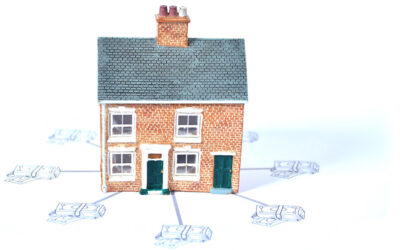
Heard the term “real estate lien” thrown around, but not sure what a lien on property is?
Liens can be general or specific, voluntary or involuntary. As the name suggests, a voluntary lien (such as a mortgage lien) is one you agree to. An involuntary lien (such as a judgment against you)… not so much.
Despite the official definition being in legalese, liens are actually quite simple. Here’s what you need to know about real estate liens — including how to remove them.
What Is a Lien on Property?
A lien is a legal claim to your property in the event you default on a payment.
In other words, a lien against your property makes it collateral in case you default.
The most common example lies in mortgage loans. When you take out a mortgage, the lender places a lien against your property in your county’s public records. You signed this document at the settlement table, called either the “Mortgage Note” or the “Deed of Trust.”
It gives the lender the right to repossess the collateral — your property — if you default on your payments. You know this process as foreclosure.
Lenders can record liens against other types of property too, not just real estate. For example, when you take out a car loan, the lender places a lien on your car as the collateral for the loan. If you stop paying, they repossess your car.
How Do Liens Work?
A lien gives a creditor the legal right to collect their debt by repossessing or forcing the sale of your property.
When you borrow a secured loan, such as a mortgage or car loan, you voluntarily sign a deed of trust or mortgage document to place the lien against your property. That secured collateral is precisely why you can borrow money cheaply: the lien protects the lender in case you default.
However, creditors can sometimes place liens on your property against your will, called an involuntary lien. If you fail to pay your taxes, for instance, the IRS can place a tax lien on your property to recover what you owe. More on the different types of liens shortly.
When you go to sell a property, you must repay all debts secured with a lien against it. Otherwise, the property can’t convey to the new owner with a clean title history.
Say a property has multiple liens against it, from two mortgage loans you borrowed. The loan in first lien position (your first mortgage) gets first priority for repayment. Your second mortgage only gets paid back after the first mortgage loan is paid in full. Assuming you owe less than the sales price, everyone gets back in full. But what if you’re upside-down on the property?
For example, say you owe $100,000 on a first mortgage and $25,000 on a second mortgage, but your property only sells for $115,000. Ignoring closing costs, your first lender would receive the full $100,000, and your second mortgage lender would get only $15,000. They could then pursue you for a deficiency judgement for the remaining $10,000 you owe them.
Lastly, note that liens appear in a title search on your property, but not on your credit report. Judgments do appear on your credit report however, and damage your credit score.
Lien Order & Priority
Imagine someone has two mortgages and a HELOC against a property, and they default. Which lenders get paid first?
For any given property with multiple liens, there’s a priority order. In most cases, liens are ordered chronologically. The first lien recorded gets first priority, the second lien gets second priority, and so forth.
If you default and the property goes to foreclosure, the money goes toward paying off the lender in first lien position. If there’s any money left over after that, it goes to the lender in second lien position. And so it goes, and if any proceeds remain after paying off all creditors, you get them.
But as in everything else, the government can do whatever it wants and jump the line to get paid first if they secure a tax lien against you. Uncle Sam always wins in the end.
Interest on Judgments & Liens
While mortgage lenders nearly always foreclose if you default on your monthly payments, most other lienholders rarely go through the hassle of foreclosing.
Instead, they wait for you to come to them. They know you have to when you want to sell your property.
And when you do come to them asking for a payoff quote, they charge you interest for all the years or decades that you owed an outstanding balance.
The maximum interest rate that judgment holders can charge varies by state. On the low end, New Jersey only allows 3.5% per year, while creditors can charge up to 12% in Vermont, Massachusetts, Rhode Island, and Washington.
Types of Real Estate Liens
As outlined above, there are many types of liens on property. Here are a few of the most common liens against real estate you’ll encounter.
Mortgage Liens
As the most common lien against real property, homeowners and real estate investors voluntarily agree to mortgage liens when they borrow money against a property.
In fact, the lien is the very thing that makes the loan “against a property.”
You own the property, but the bank can foreclose to force the sale if you default on your loan payments. It works the same whether you borrow a homeowner mortgage or a rental property loan and whether you borrow from a hard money lender, a conventional lender, or a portfolio lender.
HELOC Liens
When you take out a home equity line of credit (HELOC), it works as a rotating line of credit, similar to a credit card. You can pull money from it at any time, and repay it on your own schedule, plus interest of course.
But while most credit cards are unsecured, HELOCs come with a lien on your property. You sign a deed of trust, putting your property up as collateral. It’s precisely why HELOCs come with such lower interest rates than unsecured credit cards.
Note that you can take out a HELOC against a rental property, not just against your primary residence. Check out Figure as a fast, flexible HELOC lender that works with landlords too, not just homeowners.
IRS Liens & Other Tax Liens
The taxman cometh — for your home, if you don’t pay them what they think you owe.
Unlike mortgage loans and HELOCs, the government can record an involuntary lien against your property. You don’t need to voluntarily agree to it or sign any legal documents.
Nor is it only the federal government that can attach tax liens on your property. State and local governments can do it too, for unpaid taxes ranging from income taxes to property taxes.
Word to the wise: pay your taxes in full and on time. Go ahead and take every possible rental property deduction, take full advantage of real estate depreciation, and use every other legal option to avoid capital gains taxes and income taxes. But if you bend the rules with Uncle Sam, he’ll bend you to the breaking point.
Judgment Liens
If someone sues you in court and wins, the judge awards them a money judgment. They can then file to secure that judgment as a lien against your home, investment properties, or other assets.
From there, they can foreclose to force the sale and recover their money. That said, judgment holders rarely foreclose, because it costs so much money, and there would have to be enormous equity in the property for them to collect money after paying off any mortgage balances.
And yes, if you lose a landlord lawsuit, the plaintiff can attach their judgment as a lien, just like any other judgment.
In addition to putting a lien on your property, judgment holders can also garnish your wages or go after your personal property. That includes your vehicles, second homes, boats, jewelry, and other personal assets.
Child Support Liens & Family Law Liens
If you fail to pay child support or alimony, your ex-spouse can secure a lien against your real property.
The process varies by state. In some states, your ex can file a lien for unpaid child support or alimony directly with the county recorder and secure the debt against your property. In others, they have to file in court for a judgment against you. You can check the lien process in your state at the Office of Child Support Enforcement website.
The custodial parent or your ex-spouse can force the sale of your home or investment property to recover the money you owe. Or they can simply wait until you sell or refinance to collect on the lien.
(article continues below)
Mechanics’ Liens
When a property owner fails to pay a contractor for their work, they can take the homeowner or landlord to court over it and secure a mechanic’s lien against the property.
Just as with any other lien, the contractor can foreclose if they wish. But like judgment lien holders, they rarely do. Instead, they usually wait until the property owner goes to sell, then collect their balance.
While you have many options to deal with bad contractors, simply refusing to pay their bills isn’t one of them.
HOA Liens
Homeowners’ associations or condo associations can also place a lien against your property if you violate their bylaws or fail to pay your dues. And like other lienholders, they can opt to file foreclosure proceedings, but rarely do.
Make sure you understand exactly what you’re getting yourself into before buying a property governed by a homeowner’s association or condominium association.
How to Remove a Lien
The easiest way to remove a lien is, of course, to simply repay the debt in full.
When you pay off your mortgage in full, the lender files a lien release with your county recorder to remove the lien against your property. If you pay the bill to a contractor who placed a mechanic’s lien on your property, make sure they file a similar lien release.
But everything in life is negotiable. Before writing a check, make a lowball offer to settle the debt. Make it clear that you have no intention of selling the property — otherwise, they’d know they have you over a barrel — but that you’re looking to clean up your credit history.
Alternatively, you can file in court to remove a lien if you feel that it is erroneous or that the lienor didn’t follow legal procedures in its recording. If the lienor used bad faith, fraud, or coercion in any way, you can take them to court to remove the lien.
Judgments and some liens can also expire, based on their statute of limitations. You could potentially just wait them out, if you don’t mind holding the property and collecting rents and cash flow.
Lastly, you could declare bankruptcy. But in doing so, secured liens don’t just disappear. If you declare a Chapter 7 bankruptcy (liquidation), the court can order you to sell properties to satisfy the liens. Unsecured judgments do typically disappear, however. In a Chapter 13 bankruptcy, the court simply works out a new payment plan for you to pay off the debts.
FAQs About Liens on Property
If you still have questions beyond the basics of what is a lien and how liens work, check for an answer below.
Who can put a lien on your house?
Most commonly, mortgage lenders put a lien on your house or rental property. But anyone with a judgment against you can secure a lien against any real property that you own. That includes the IRS, state and local governments, plaintiffs who have sued you and won, your ex-spouse and/or custodial parent of your child, or contractors or anyone else you owe money.
What happens when someone puts a lien on my house?
Bad things. In most cases, they can foreclose on you if they so choose. But the foreclosure process is expensive, so they may just wait you out and collect when you sell or refinance the house.
Can someone put a lien on my property without notice?
In most cases, you know when someone goes to put an involuntary lien against your property. They sue you for a judgment first, or otherwise take you to court. But it’s possible that someone could put a lien against your house without you knowing — at least until it comes time to sell or refinance.
Can a family member place a lien on my house?
Anyone who you owe money to could theoretically put a lien on your home or investment property. That especially includes ex-spouses who you owe alimony or child support to, but it could be anyone. If they get a judgment against you, they can secure it against real property that you own.
Can a lien be placed on jointly owned property?
It depends on several factors. First, different states impose different laws about liens on jointly owned properties. Second, the rules often vary based on how you own title together. Married couples who own properties as tenants by the entirety are treated differently than, say, two friends who own a property together as joint tenants. Look up exactly how liens on jointly owned properties work in your particular state and legal ownership structure for the property.
How to find a lien on property?
Liens are a matter of public record, and you can look them up for free. Look up your county clerk, recorder, or tax assessor website, where you should be able to run a search for liens against your property (and anyone else’s, for that matter).
You can also pay for commercial services that offer more user-friendly interfaces. But start with a free public records search, and don’t be afraid to call your country records office if you have trouble.
Do property liens show on credit reports?
Liens attach to real property, not to you personally. But while liens don’t appear on your credit report, judgments do. Remember, judgments attach to you personally, and creditors can then attach those judgments to your property as a way to enforce them. They collect on the debt by securing it against your property.
How long will a lien on your property last?
Generally speaking, liens last until the creditor releases them. They must release the lien if you pay the debt off in full, and in some cases they’ll accept a short sale payoff to release the lien.
Is there a statute of limitations on property liens?
While liens don’t “expire” in the traditional sense, judgments do expire after ten years, unless the creditor files in court to extend them another ten years. They cannot be extended a second time in most states. So you can theoretically wait out judgment liens — if you’re willing to wait 10-20 years.
Final Thoughts
What is a real estate lien? The legal attachment of a debt to your property.
While they usually happen with your consent, in the case of a mortgage loan or HELOC, other people, companies, and governments can place liens on your property without your consent if you fail to pay them what you legally owe. Title companies require you to pay off all liens before you can legally transfer title to a buyer.
Pay your debts or watch your creditors come after your property.♦
Have any questions beyond “What is a lien on property?” What else do you want to know about real estate liens?
More Real Estate Investing Reads:
About the Author

G. Brian Davis is a landlord, real estate investor, and co-founder of SparkRental. His mission: to help 5,000 people reach financial independence by replacing their 9-5 jobs with rental income. If you want to be one of them, join Brian, Deni, and guest Scott Hoefler for a free masterclass on how Scott ditched his day job in under five years.



























I didn’t realize contractors could put a lien against your home!
Yep, gotta pay your contractor or dispute the billing in court.
I never thought that there are many types of lien! Thanks for sharing.
Glad you got something out of it Jim!
I didn’t fully understand lien position, thanks for clearing that up!
You got it Ivan!
That is right! If you don’t understand the legal enforcement mechanisms behind liens, you leave yourself open to nasty surprises later.
Absolutely Kyle.
If there is a lien placed on a rental property, Is the home still able to be used as a business and generate income?
Yes, although the lienholder could try to foreclose the lien and force the sale of the property.
How do you find out, if there is a lien on property.
Hi Richard, it’s available to look up in your municipality’s public records. Most municipalities offer this information online, so check your county/city website.
can you have a split 1st lien on a residential property if they are not filed at the same time ?
Hi Alan, no, liens always get prioritized, typically by the order in which they’re recorded.
Loans (and liens) are fine as long as you have an exit strategy. Some people get too cocky with leverage and find themselves upside-down or cash flow negative.
Very true Penpen!